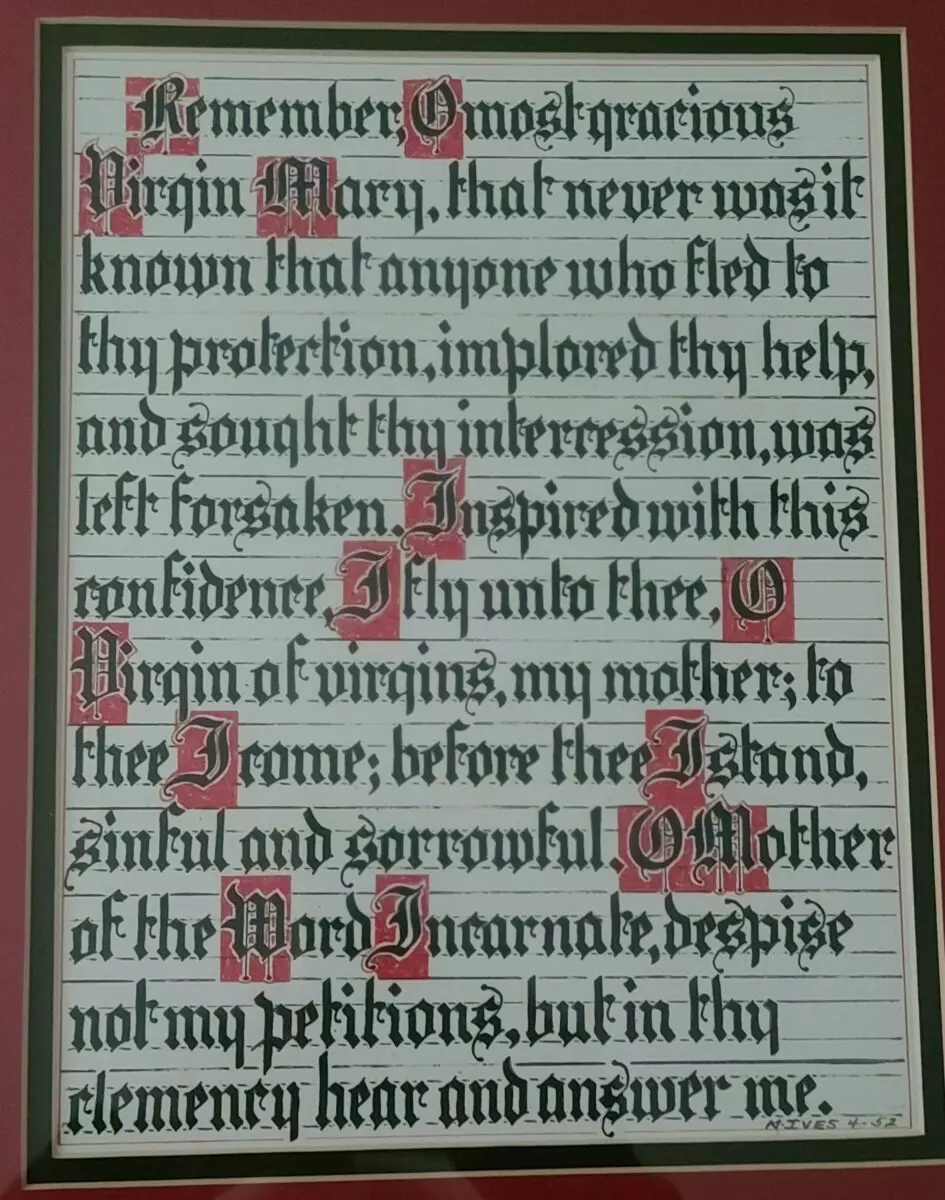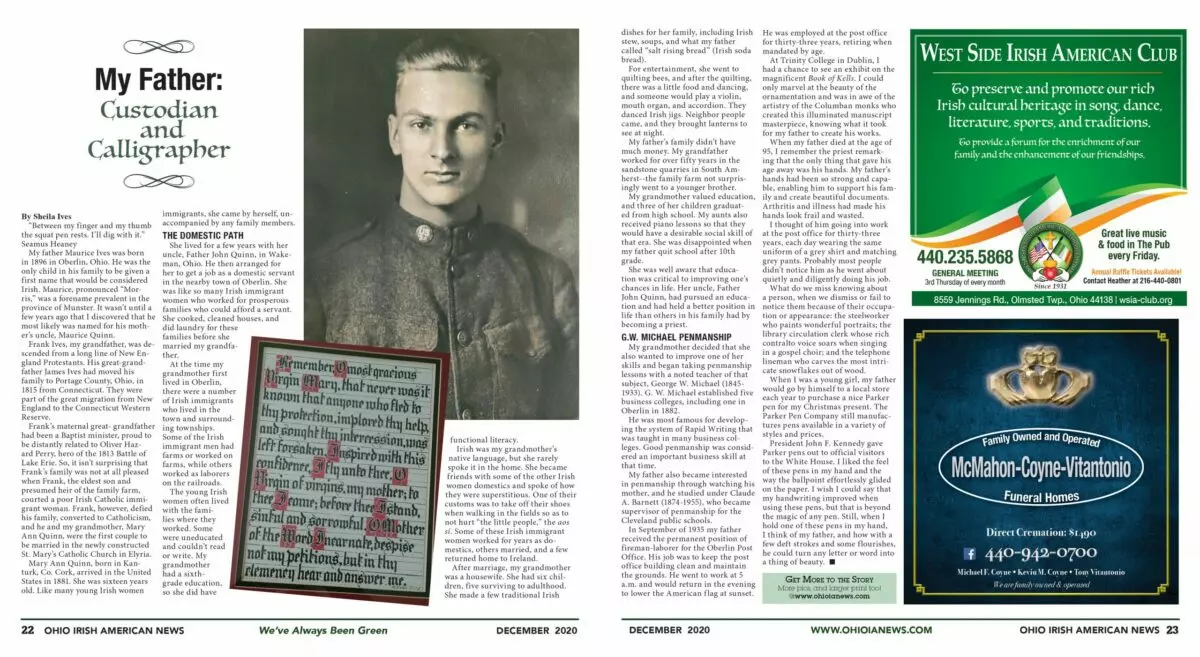My Father: Custodian and Calligrapher
By Sheila Ives
“Between my finger and my thumb, the squat pen rests. I’ll dig with it.” Seamus Heaney
My father Maurice Ives was born in 1896 in Oberlin, Ohio. He was the only child in his family to be given a first name that would be considered Irish. Maurice, pronounced “Morris,” was a forename prevalent in the province of Munster. It wasn’t until a few years ago that I discovered that he most likely was named for his mother’s uncle, Maurice Quinn.
Frank Ives, my grandfather, was descended from a long line of New England Protestants. His great-grandfather James Ives had moved his family to Portage County, Ohio, in 1815 from Connecticut. They were part of the great migration from New England to the Connecticut Western Reserve.
Frank’s maternal great-grandfather had been a Baptist minister, proud to be distantly related to Oliver Hazard Perry, hero of the 1813 Battle of Lake Erie. So, it isn’t surprising that Frank’s family was not at all pleased when Frank, the eldest son and presumed heir of the family farm, courted a poor Irish Catholic immigrant woman. Frank, however, defied his family, and converted to Catholicism, and he and my grandmother, Mary Ann Quinn, were the first couple to be married in the newly constructed St. Mary’s Catholic Church in Elyria.
Mary Ann Quinn, born in Kanturk, Co. Cork, arrived in the United States in 1881. She was sixteen years old. Like many young Irish women immigrants, she came by herself, unaccompanied by any family members.
The Domestic Path
She lived for a few years with her uncle, Father John Quinn, in Wakeman, Ohio. He then arranged for her to get a job as a domestic servant in the nearby town of Oberlin. She was like so many Irish immigrant women who worked for prosperous families who could afford a servant. She cooked, cleaned houses, and did laundry for these families before she married my grandfather.
At the time my grandmother first lived in Oberlin, there were a number of Irish immigrants who lived in the town and surrounding townships. Some of the Irish immigrant men had farms or worked on farms, while others worked as laborers on the railroads.
The young Irish women often lived with the families where they worked. Some were uneducated and couldn’t read or write. My grandmother had a sixth-grade education, so she did have functional literacy.
Irish was my grandmother’s native language, but she rarely spoke it in the home. She became friends with some of the other Irish women domestics and spoke of how they were superstitious. One of their customs was to take off their shoes when walking in the fields so as to not hurt “the little people,” the aos sí. Some of these Irish immigrant women worked for years as domestics, others married, and a few returned home to Ireland.
After marriage, my grandmother was a housewife. She had six children, five surviving to adulthood. She made a few traditional Irish dishes for her family, including Irish stew, soups, and what my father called “salt rising bread” (Irish soda bread).
For entertainment, she went to quilting bees, and after the quilting, there was a little food and dancing, and someone would play a violin, mouth organ, and accordion. They danced Irish jigs. Neighbor people came, and they brought lanterns to see at night.
My father’s family didn’t have much money. My grandfather worked for over fifty years in the sandstone quarries in South Amherst–the family farm not surprisingly went to a younger brother.
My grandmother valued education, and three of her children graduated from high school. My aunts also received piano lessons so that they would have a desirable social skill of that era. She was disappointed when my father quit school after 10th grade.
She was well aware that education was critical to improving one’s chances in life. Her uncle, Father John Quinn, had pursued an education and had held a better position in life than others in his family had by becoming a priest.
G.W. Michael Penmanship
My grandmother decided that she also wanted to improve one of her skills and began taking penmanship lessons with a noted teacher of that subject, George W. Michael (1845-1933). G. W. Michael established five business colleges, including one in Oberlin in 1882.
He was most famous for developing the system of Rapid Writing that was taught in many business colleges. Good penmanship was considered an important business skill at that time.
My father also became interested in penmanship through watching his mother, and he studied under Claude A. Barnett (1874-1955), who became supervisor of penmanship for the Cleveland public schools.

In September of 1935 my father received the permanent position of fireman-laborer for the Oberlin Post Office. His job was to keep the post office building clean and maintain the grounds. He went to work at 5 a.m. and would return in the evening to lower the American flag at sunset. He was employed at the post office for thirty-three years, retiring when mandated by age.
At Trinity College in Dublin, I had a chance to see an exhibit on the magnificent Book of Kells. I could only marvel at the beauty of the ornamentation and was in awe of the artistry of the Columban monks who created this illuminated manuscript masterpiece, knowing what it took for my father to create his works.
When my father died at the age of 95, I remember the priest remarking that the only thing that gave his age away was his hands. My father’s hands had been so strong and capable, enabling him to support his family and create beautiful documents. Arthritis and illness had made his hands look frail and wasted.
I thought of him going into work at the post office for thirty-three years, each day wearing the same uniform of a grey shirt and matching grey pants. Probably most people didn’t notice him as he went about quietly and diligently doing his job.
What do we miss knowing about a person, when we dismiss or fail to notice them because of their occupation or appearance: the steelworker who paints wonderful portraits; the library circulation clerk whose rich contralto voice soars when singing in a gospel choir; and the telephone lineman who carves the most intricate snowflakes out of wood.
When I was a young girl, my father would go by himself to a local store each year to purchase a nice Parker pen for my Christmas present. The Parker Pen Company still manufactures pens available in a variety of styles and prices.
President John F. Kennedy gave Parker pens out to official visitors to the White House. I liked the feel of these pens in my hand and the way the ballpoint effortlessly glided on the paper. I wish I could say that my handwriting improved when using these pens, but that is beyond the magic of any pen. Still, when I hold one of these pens in my hand, I think of my father, and how with a few deft strokes and some flourishes, he could turn any letter or word into a thing of beauty.





